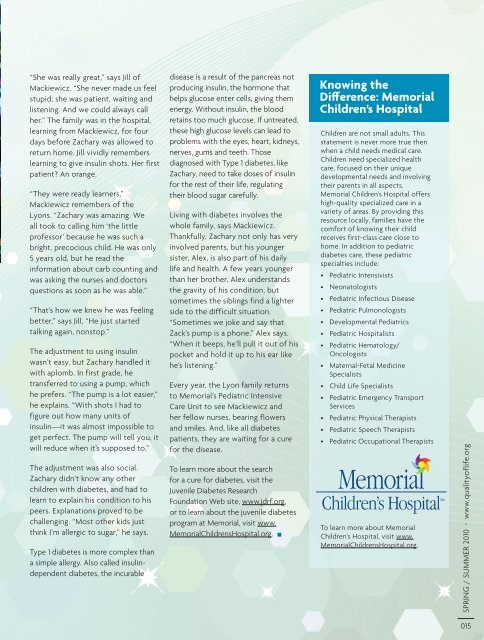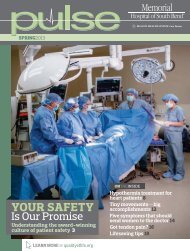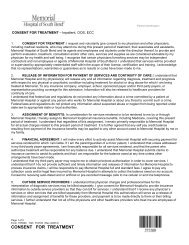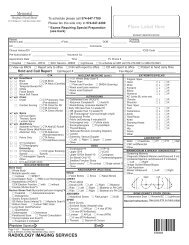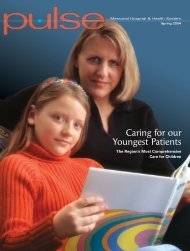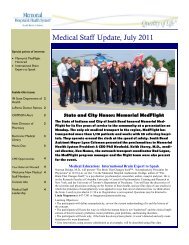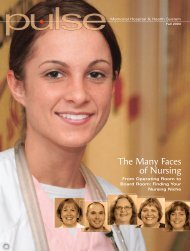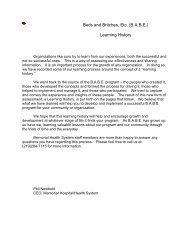First Impressions - Memorial Hospital of South Bend
First Impressions - Memorial Hospital of South Bend
First Impressions - Memorial Hospital of South Bend
- No tags were found...
You also want an ePaper? Increase the reach of your titles
YUMPU automatically turns print PDFs into web optimized ePapers that Google loves.
“She was really great,” says Jill <strong>of</strong>Mackiewicz. “She never made us feelstupid; she was patient, waiting andlistening. And we could always callher.” The family was in the hospital,learning from Mackiewicz, for fourdays before Zachary was allowed toreturn home. Jill vividly rememberslearning to give insulin shots. Her firstpatient? An orange.“They were ready learners,”Mackiewicz remembers <strong>of</strong> theLyons. “Zachary was amazing. Weall took to calling him ‘the littlepr<strong>of</strong>essor’ because he was such abright, precocious child. He was only5 years old, but he read theinformation about carb counting andwas asking the nurses and doctorsquestions as soon as he was able.”“That’s how we knew he was feelingbetter,” says Jill, “He just startedtalking again, nonstop.”The adjustment to using insulinwasn’t easy, but Zachary handled itwith aplomb. In first grade, hetransferred to using a pump, whichhe prefers. “The pump is a lot easier,”he explains. “With shots I had t<strong>of</strong>igure out how many units <strong>of</strong>insulin—it was almost impossible toget perfect. The pump will tell you, itwill reduce when it’s supposed to.”The adjustment was also social.Zachary didn’t know any otherchildren with diabetes, and had tolearn to explain his condition to hispeers. Explanations proved to bechallenging. “Most other kids justthink I’m allergic to sugar,” he says.Type 1 diabetes is more complex thana simple allergy. Also called insulindependentdiabetes, the incurabledisease is a result <strong>of</strong> the pancreas notproducing insulin, the hormone thathelps glucose enter cells, giving themenergy. Without insulin, the bloodretains too much glucose. If untreated,these high glucose levels can lead toproblems with the eyes, heart, kidneys,nerves, gums and teeth. Thosediagnosed with Type 1 diabetes, likeZachary, need to take doses <strong>of</strong> insulinfor the rest <strong>of</strong> their life, regulatingtheir blood sugar carefully.Living with diabetes involves thewhole family, says Mackiewicz.Thankfully, Zachary not only has veryinvolved parents, but his youngersister, Alex, is also part <strong>of</strong> his dailylife and health. A few years youngerthan her brother, Alex understandsthe gravity <strong>of</strong> his condition, butsometimes the siblings find a lighterside to the difficult situation.“Sometimes we joke and say thatZack’s pump is a phone,” Alex says.“When it beeps, he’ll pull it out <strong>of</strong> hispocket and hold it up to his ear likehe’s listening.”Every year, the Lyon family returnsto <strong>Memorial</strong>’s Pediatric IntensiveCare Unit to see Mackiewicz andher fellow nurses, bearing flowersand smiles. And, like all diabetespatients, they are waiting for a curefor the disease.To learn more about the searchfor a cure for diabetes, visit theJuvenile Diabetes ResearchFoundation Web site, www.jdrf.org,or to learn about the juvenile diabetesprogram at <strong>Memorial</strong>, visit www.<strong>Memorial</strong>Childrens<strong>Hospital</strong>.org. •Knowing theDifference: <strong>Memorial</strong>Children’s <strong>Hospital</strong>Children are not small adults. Thisstatement is never more true thenwhen a child needs medical care.Children need specialized healthcare, focused on their uniquedevelopmental needs and involvingtheir parents in all aspects.<strong>Memorial</strong> Children’s <strong>Hospital</strong> <strong>of</strong>fershigh-quality specialized care in avariety <strong>of</strong> areas. By providing thisresource locally, families have thecomfort <strong>of</strong> knowing their childreceives first-class care close tohome. In addition to pediatricdiabetes care, these pediatricspecialties include:• Pediatric Intensivists• Neonatologists• Pediatric Infectious Disease• Pediatric Pulmonologists• Developmental Pediatrics• Pediatric <strong>Hospital</strong>ists• Pediatric Hematology/Oncologists• Maternal-Fetal MedicineSpecialists• Child Life Specialists• Pediatric Emergency TransportServices• Pediatric Physical Therapists• Pediatric Speech Therapists• Pediatric Occupational TherapistsTo learn more about <strong>Memorial</strong>Children’s <strong>Hospital</strong>, visit www.<strong>Memorial</strong>Childrens<strong>Hospital</strong>.org.SPRING / SUMMER 2010 › www.quality<strong>of</strong>life.org015


